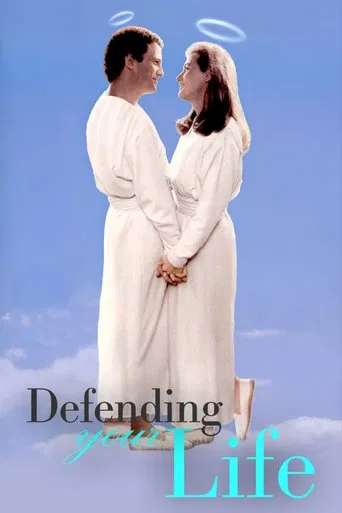

A comedy about what happens and how everything happens after we die starring Albert Brooks and Meryl Streep? Count me in. Besides a few supporting roles (and of course his work in Finding Nemo), I'm not as familiar with Brooks' work as I probably should be. He's a perfect example of a guy who clearly has comedic talent but the only way you can connect (just like every comedy) is if his comedy hits you in the right way. Brooks' dry humor is definitely solid, albeit doesn't translate as well to a 2018 audience member. However, the original concept, creative 'out of place' type humor, and a nice chemistry between Streep and Brooks is more than enough to replace the dated elements.7.0/10
... View MoreThis movie should have been the denouement of Albert Brooks advancement as an actor. He was terrific, he was real, he was believable, he was entertaining, he had arrived and everything was just going to get better, yet it never happened. Sure he has been successful and he's experienced a degree of success that the majority of us (in particular me) could only dream about but his laid back witty, effortless acting style appears not to have caught fire, now the both of us are 69 and unless either of us can pull something out of a hat (never happen for me) our pinnacles are behind us and it's all down hill from here. Despite what has occurred to Albert's acting career this movie is a must see and it has the terrific Meryl Streep, as well as Rip Torn, Lee Grant, and Buck Henry (quite the cast). Watch this film and I promise you'll enjoy it, it's time well spent and the ending sequence is a tear jerker! Oh and Albert is far and away the reason this film is so enjoyable! He's a hoot! I discovered this film bombed at the box office, I am quite pleased that, in my small way, I helped pad the numbers!
... View Morean useful film. this is, maybe, its the most important virtue. because it could impress you. or change you. because it is a so beautiful love story than it has the virtue to be sweet and wise and helpful lesson about the meaning of love, happiness and right decisions. because it is a real inspired speech about the after life. sure, not credible for a part of public. but useful for reflect about decisions and words and gestures. short, a film like an oasis. and discover of new significance for the colors and the links between us and the others. short - a lovely film.
... View MoreImperfect, but interesting exploration, which has been explored quite often in Hollywood movies, of the afterlife. This is another remarkable achievement of that favorite outsider, Albert Brooks.As in Broadcast News, Brooks plays a misguided, cynical and neurotic individual, but with softer edges this time. The main difference between that movie and this one, is that he actually gets sort of a happy ending. Also, where as most of the characters in Broadcast News couldn't stand him (not for a long time anyway), the supporting characters take those character traits and reduces them to fear of succeeding. Broadcast News was about Brooks screwing his life up, Defending Your Life is about not even trying to screw it up.Although, the picture is quite funny and clever there are a few sequences that don't work or are extremely underdeveloped and Brooks, a talented writer, wants it exactly that way, I think. We are not going to see an Albert Brooks film and immediately get what he's trying to tell us. Fortunately, they don't cause extreme harm to the overall enjoyment. Take the Meryl Streep character. In no way is Brooks trying to explain why her character would fall in love with him. The explanation: "Because he is the only guy there under 100 years old", is as good as you will get. Streep also thinks that Brooks' cynical attitude is endearing and not annoying. Really not that believable. But as said before, it's a minor quibble.The premise of going to trial to defend your actions or non-actions of your life is clever. But again, the stakes are not that high. If you do nothing with your life you get another one up to a point. Rip Torn's defense attorney says one guy/girl lived a hundred times. That is another weakness of the plot. There is a bizarre sequence where the defendants get to see what their past lives where. Streep sees that all her lives where basically fair, while Brooks get the underprivileged. Again, clever but the scene doesn't add that much. Only amusement of seeing Meryl Streep and Brooks with their mouthes wide open of seeing who the host of this program is.I wish that I could have given this movie a better rating, but I think there are a few too many shortcomings. However, most of the film is really funny, so I will give it an above average score.
... View More